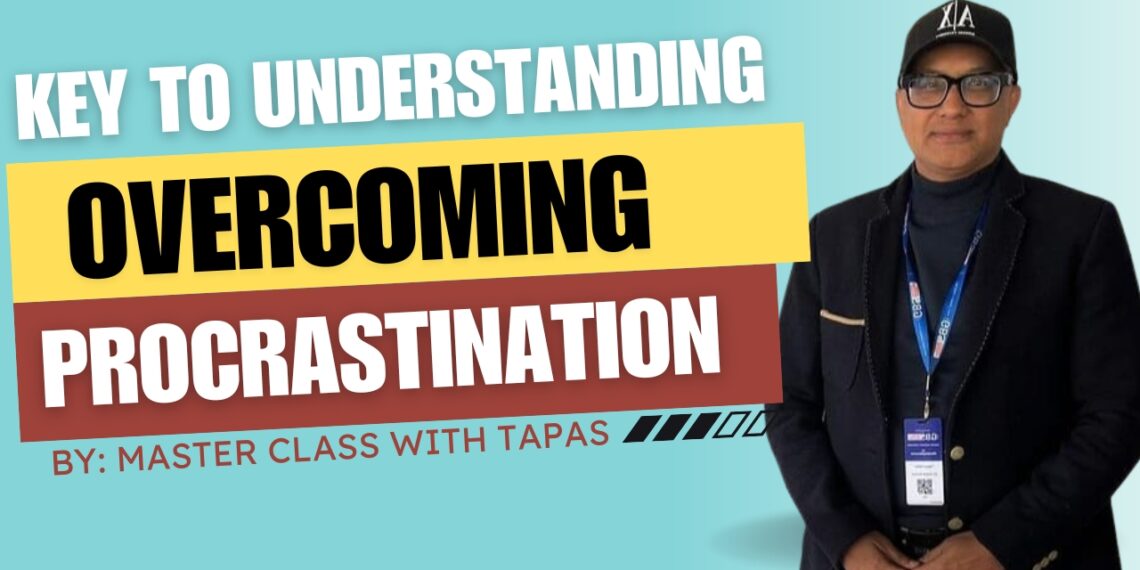Why We Procrastinate And How To Overcome It || Key to Understanding & Overcoming Procrastination
Do you often find yourself trapped in the cycle of procrastination, endlessly delaying tasks and goals? You’re not alone. Procrastination affects individuals from all walks of life, hindering productivity and impeding progress. In this comprehensive guide, we’ll explore the psychology behind procrastination, uncover common reasons for procrastinating, and provide practical strategies to overcome it. Join Master class with Tapas on this journey to reclaim your time and achieve your fullest potential.
The Psychology of Procrastination
Procrastination is more than just poor time management—it’s a complex psychological phenomenon rooted in various factors. At its core, procrastination often stems from a fear of failure or perfectionism. The anticipation of facing challenging tasks or the pressure to deliver flawless results can paralyze individuals, leading them to postpone action indefinitely. Understanding the underlying psychological mechanisms of procrastination is the first step towards overcoming it.
Common Reasons We Procrastinate
There are several common reasons why people procrastinate, each contributing to the procrastination trap in its unique way. Fear of failure, perfectionism, lack of motivation, poor time management skills, and feeling overwhelmed by the enormity of tasks are among the primary culprits. Additionally, procrastination can also be a result of seeking short-term pleasure or avoiding discomfort associated with certain tasks. By identifying the specific reasons behind procrastination, individuals can develop targeted strategies to address them effectively.
Impact on Productivity and Mental Well-being
The consequences of procrastination extend beyond missed deadlines and unfinished projects—it can significantly impact both productivity and mental well-being. Chronic procrastination leads to increased stress, anxiety, and guilt, contributing to a cycle of negative emotions and decreased self-esteem. Moreover, procrastination often results in rushed work, subpar outcomes, and missed opportunities, undermining long-term success and satisfaction. Recognizing the detrimental effects of procrastination underscores the importance of taking proactive steps to combat it.

Breaking free from the procrastination cycle requires a combination of self-awareness, discipline, and strategic planning. Here are some practical tips to help you overcome procrastination and boost productivity:
- Set Clear Goals and Prioritize Tasks: Break down larger goals into smaller, manageable tasks, and prioritize them based on importance and urgency.
- Create a Structured Routine: Establish a daily or weekly routine that includes dedicated time blocks for work, rest, and leisure activities. Stick to your schedule to cultivate discipline and consistency.
- Set Realistic Deadlines: Set realistic deadlines for tasks and hold yourself accountable for meeting them. Use tools like calendars, planners, or task management apps to track progress and stay on track.
- Combat Perfectionism: Challenge perfectionistic tendencies by embracing the concept of “good enough.” Focus on progress over perfection and recognize that mistakes are essential for growth and learning.
- Break Tasks into Smaller Steps: Overcome the overwhelm by breaking down complex tasks into smaller, actionable steps. Tackle one task at a time, celebrating each small victory along the way.
- Minimize Distractions: Identify and eliminate potential distractions in your environment, whether it’s turning off notifications, setting boundaries with social media, or creating a dedicated workspace free from clutter.
- Practice Self-compassion: Be kind to yourself and practice self-compassion when facing setbacks or challenges. Instead of dwelling on past procrastination, focus on the present moment and take proactive steps to move forward.
- Seek Accountability and Support: Share your goals and progress with a trusted friend, mentor, or accountability partner who can provide encouragement and support. Having someone to cheer you on can help keep you motivated and accountable.
Building Healthy Habits for Increased Efficiency
Overcoming procrastination is not a one-time fix but a continuous journey of self-improvement and growth. By incorporating these practical strategies into your daily life and cultivating healthy habits, you can increase efficiency, reduce stress, and unlock your full potential. Remember, progress takes time, so be patient and persistent in your efforts to overcome procrastination and achieve your goals.
Don’t let procrastination hold you back! Take control of your time and productivity by implementing these actionable tips today. Embrace the power of proactive action and watch as you move closer to realizing your aspirations and dreams. Start now and embark on a journey of personal and professional fulfillment with expert advice from Master class with Tapas.
